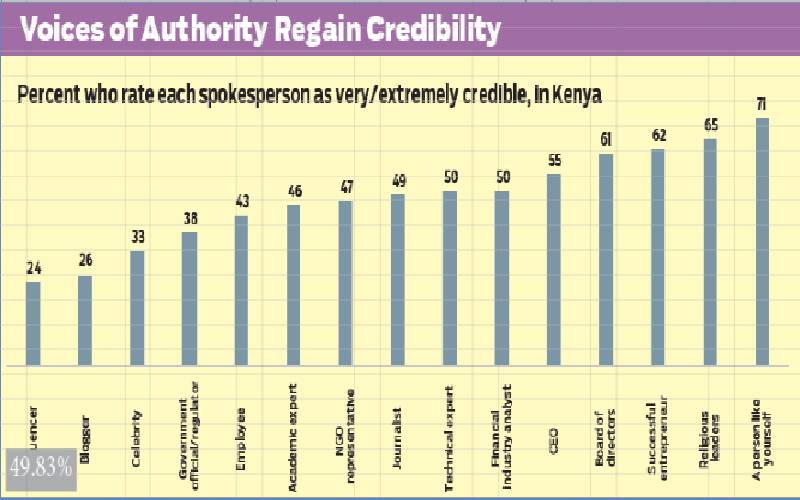 Word of mouth is the most preferred marketing tool for companies seeking to capture new audiences online, a new survey shows.
Word of mouth is the most preferred marketing tool for companies seeking to capture new audiences online, a new survey shows.
According to the survey by Edelman and Gina Din Group, this is as opposed to the use of bloggers and celebrities, a growing trend in the marketing sphere globally.
The survey found that consumers trust individuals the most, with 71 per cent of those polled saying they would purchase goods and services recommended to them by their peers through the word of mouth.
This is in light of the fact that interactions have been heightened by social media channels like WhatsApp groups, Twitter and Facebook.
On the other end of the spectrum are the influencers whose trust levels are at 24 per cent, according to the survey released yesterday, despite their growing popularity to push brands to consumers.
“Kenyans trust social media influencers, bloggers and celebrities the least as voices of authority, instead showing more trust in ordinary Kenyans,” says the survey report.
Influencers are individuals with the ability to influence potential buyers of a product or service by promoting or recommending the items on social media.
Celebrity endorsements, bloggers and influencers have grown in the public relations market over the years, both locally and globally, but failure to disclose their financial motivation and general suspicion of advertisement has eroded their trust.
For instance, Always Kenya recently became the subject of an online backlash for hiring influencers to push new product while burying personal testimonies by women complaining about their experiences with the product.
The company had treated influencers to a luxurious weekend as part of the launch of its new brand of sanitary pads, Always Ultra Soft.
Using the #FeelTheComfortAlways hashtag, the brand used influencers to push the new product online.
The backlash drew the firm’s attention, forcing it to respond to clients’ concerns. Activist Boniface Mwangi also pushed back on AAR Insurance, forcing the firm to settle a medical bill it had previously declined in what is now a growing power of personal voice over online channels.
The report also says Kenyans are going back to traditional media for fear of fake news despite the popularity of digital platforms in breaking news online.
“The increased trust of traditional media reflects the fact that more Kenyans (73 per cent) are worried about false information or fake news being used as a weapon,” says the report.
 The Standard Group Plc is a multi-media organization with investments in media
platforms spanning newspaper print operations, television, radio broadcasting,
digital and online services. The Standard Group is recognized as a leading
multi-media house in Kenya with a key influence in matters of national and
international interest.
The Standard Group Plc is a multi-media organization with investments in media
platforms spanning newspaper print operations, television, radio broadcasting,
digital and online services. The Standard Group is recognized as a leading
multi-media house in Kenya with a key influence in matters of national and
international interest.
 The Standard Group Plc is a multi-media organization with investments in media
platforms spanning newspaper print operations, television, radio broadcasting,
digital and online services. The Standard Group is recognized as a leading
multi-media house in Kenya with a key influence in matters of national and
international interest.
The Standard Group Plc is a multi-media organization with investments in media
platforms spanning newspaper print operations, television, radio broadcasting,
digital and online services. The Standard Group is recognized as a leading
multi-media house in Kenya with a key influence in matters of national and
international interest.

 Word of mouth is the most preferred marketing tool for companies seeking to capture new audiences online, a new survey shows.
Word of mouth is the most preferred marketing tool for companies seeking to capture new audiences online, a new survey shows.








